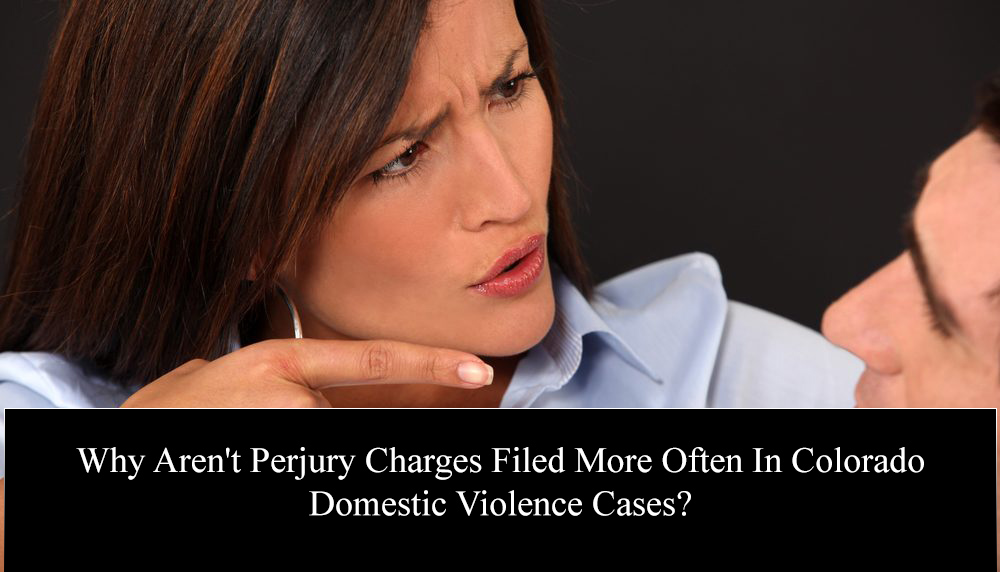




Why Aren’t Perjury Charges Filed More Often In Colorado Domestic Violence Cases?
By H. Michael Steinberg Colorado Criminal Domestic Violence Defense Lawyer – Attorney
 Why Aren’t Perjury Charges Filed More Often In Colorado Domestic Violence Cases? The impact on the lives of men accused of false allegations of domestic violence in Colorado is so destructive on these men that – upon proof of the falsity of the allegations – the accusers should be arrested and charged with equally serious crimes – such as False Reporting To Authorities or even the crime of Perjury.
Why Aren’t Perjury Charges Filed More Often In Colorado Domestic Violence Cases? The impact on the lives of men accused of false allegations of domestic violence in Colorado is so destructive on these men that – upon proof of the falsity of the allegations – the accusers should be arrested and charged with equally serious crimes – such as False Reporting To Authorities or even the crime of Perjury.
This article addresses the options that are available to prosecutors and why these those making false allegations of domestic violence are so rarely held accountable.
Most Alleged Victims In Colorado Domestic Violence Cases – Recant
Perjury is a serious problem in Colorado domestic violence cases. But because of political correctness Colorado District Attorneys – (aware that an alleged domestic violence victim is lying under oath or lied in the original 911 call and subsequent interview) – refuse to charge these – mostly women – with false statements to police, attempt to influence public servant – or the various forms of Colorado perjury.
It is clearly politically incorrect to say that many women file charges against boyfriends, significant others or spouses on a routine basis, only later to recant these allegations when the case comes to trial. Many of these alleged perpetrators are not guilty of anything except making the woman in their life angry. For the women, who are aware of methods of gaming the system – there are simply no consequences for filing charges based on false allegations of domestic violence.
Truthful testimony is critical to the kind of integrity and justice we expect in the criminal system.
It has been said that:
All perjured relevant testimony is at war with justice, since it may produce a judgment not resting on truth. Therefore it cannot be denied that it tends to defeat the sole ultimate objective of a trial.
Perjury poses one of the greatest threats to the judicial system. Perjury that is the result of false statements in Colorado domestic violence cases is epidemic and is believed to occur in 50 to 90 percent of all domestic violence cases. That means in more than half of all Colorado domestic violence cases – victims end up recanting their statements.
Recantation is the norm rather than the exception, in Colorado domestic violence cases.
Recanting testimony means trying to take back or withdraw a prior statement. It almost always involves falsity in either the original or the later statement.
Perjury has been defined as “deliberately making false or misleading statements while under oath.” Perjurious testimony hinders the discovery of the truth. The problem is so bad in Colorado domestic violence cases it is severely “evaporating” whatever confidence people still have in the court system.
While prosecutors will try every trick they can to explain an alleged domestic violence victim’s recantation – for example using so called “expert testimony” at trial to include psychologists, counselors, and even the police officers involved – sometimes the evidence of the lie is as plain and as unavoidable as day.
The truth often is that the alleged victim lied to the police at the time of the report or later under oath at trial for reasons motivated, not by fear of an abuser, but because of a perceived advantage they may receive at a later date.
As noted, alleged domestic violence victims usually begin “the lie” with the initial complaint – the 911 call. The 911 call can sometimes be the result of jealously, revenge, anger, or to win anticipated custody disputes. When the DA realizes the victim has lied – (if he or she catches the lie) – the majority responses of Colorado District Attorneys – out of fear of the feminist lobby – is to turn a blind eye to this crime.
Why No Consequences For Alleged Domestic Violence “Victims” Who Commit Perjury?
As noted – perjury destroys lives and harms the integrity of the criminal justice system.
The decision not to charge the crime must – at a minimum – should be based on the “why” behind the lie. Why the alleged domestic violence victim cannot be avoided in deciding to charge or not to charge the alleged victim with a new criminal case.
I understand that not all cases of perjury or false statements to the police should be charged. Domestic violence cases can be, and almost always are, complicated, and the motives for lying in Colorado domestic violence cases are diverse. But the impact of lying in these cases includes not only the devastation it wreaks on the accused on everyone in the system.
Police departments are also victims of lying alleged domestic violence victims. The police have even tried taking sworn statements at the scene for fear that the victim will later recant. Colorado law enforcement actually use separate forms specifically designed for domestic violence cases.
Why these forms? – because they know the alleged victim might – WILL probably later recant their statements to the police.
Why Alleged Domestic Violence Victims Lie – Underlying Motivations for False Statements
The destruction that is caused by false allegations of domestic violence is clear but what motivates some domestic violence victims to lie is more varied. The “why” behind the lie of a false allegations of domestic violence could be anything such as revenge for infidelity or because of an ongoing custody dispute – but in all cases the lies are clearly based on self-motivated objectives.
The disrespect and contempt for our criminal justice system by these lying victims has slowly emerged from the 1980’s when I started out as a young prosecutor in Colorado. The police were heavily criticized for mediating domestic disputes and would sometimes not arrest the accused batterer if they thought another less destructive avenue was possible. In those days, the police had discretion to determine whether or not a crime was committed in family violence cases.
The 80’s brought many laws that – domestic violence legislation reforms – that included such policies as mandatory arrest and no drop mandates employed by elected District Attorneys and City Prosecutors of Colorado.
Today, a simple verbal allegation of domestic violence will satisfy the low probable cause standard necessary to make an arrest regardless of the presence of other corroborating evidence such as bruises or redness of the skin. For the self-motivated victim in a system that overwhelmingly presumes that the “victim” is telling the truth – the benefits associated in making false statements to the police or in committing perjury at trial – clearly outweigh her costs. There is only a minimal risk of prosecution and conviction based on the classic refusal of prosecutors to file charges as a result of a reluctance to prosecute someone who once claimed to be a victim of abuse.
These complainants, who were never actually abused and make the conscious decision to file a false report, should always be held accountable.
When alleged victims of domestic violence lie they should be held accountable for breaking the law. It is the opinion of many in the system that:
Ignoring victim wrongdoing actually reinforces stereotypes of domestic violence victims as weak, irrational, and untrustworthy.
The prevalence of recanting in Colorado domestic violence cases has lead to judges and attorneys who can easily detect these false allegations when compared to other types of cases. The stakeholders in the system must no longer knowingly ignore perjured statements and testimony for by doing so makes the attorneys and courts complicit in the wrongful act. When the system remains silent in the face of false allegations of domestic violence the Colorado criminal justice system is sanctioning perjury.
Summary and Conclusion – Why Aren’t Perjury Charges Filed More Often In Colorado Domestic Violence Cases?
When a so called domestic violence victim provides false testimony to a police officer which then leads to an arrest – or later lies in court – the criminal justice system is harmed and becomes a secondary victim.
The message must be clear – there must be repercussions for domestic violence victims who intentionally lie. Choices must have consequences and it cannot be acceptable to turn a blind eye to the consequences of false statements to the police or perjury in the courtroom.
I have written about perjury and false statements in the Colorado criminal justice system many times. Colorado has several criminal statutes that punish both false statements and perjury and I have included them below.
In Colorado domestic violence cases recantations have become a veritable “epidemic.” It is time to enforce the law.
What follows are the majority of Colorado Statutes (Laws) That address punishing those who lie in the criminal justice system.
§ 18-8-501 Definitions (Relating To Perjury)
The definitions in sections 18-8-101 and 18-8-301 are applicable to this part 5, and, in addition to those definitions:
(1) “Materially false statement” means any false statement, regardless of its admissibility under the rules of evidence, which could have affected the course or outcome of an official proceeding, or the action or decision of a public servant, or the performance of a governmental function.
(2) (a) “Oath” includes an affirmation and every other mode authorized by law of attesting to the truth of that which is stated. For the purposes of this section, written statements shall also be treated as if made under oath if:
(I) The statement was made on or pursuant to a form bearing notice, authorized by law, to the effect that false statements made therein are punishable; or
(II) The statement recites that it was made under oath, the declarant was aware of such recitation at the time he made the statement and intended that the statement should be represented as a sworn statement, and the statement was in fact so represented by its delivery or utterance with the signed jurat of an officer authorized to administer oaths appended thereto; or
(III) The statement is made, used, or offered with the intent that it be accepted as compliance with a statute, rule, or regulation which requires a statement under oath or other like form of attestation to the truth of the matter contained in the statement; or
(IV) The statement meets the requirements for an unsworn declaration under the “Uniform Unsworn Foreign Declarations Act”, part 3 of article 55 of title 12, C.R.S.
(b) An oath is “required or authorized by law” when the use of the oath is specifically provided for by statute, court rule, or appropriate regulatory provision.
(3) “Official proceeding” means a proceeding heard before any legislative, judicial, administrative, or other government agency, or official authorized to hear evidence under oath, including any magistrate, hearing examiner, commissioner, notary, or other person taking testimony or depositions in any such proceedings.
§ 18-8-502. Perjury in the First Degree
(1) A person commits perjury in the first degree if in any official proceeding he knowingly makes a materially false statement, which he does not believe to be true, under an oath required or authorized by law.
(2) Knowledge of the materiality of the statement is not an element of this crime, and the defendant’s mistaken belief that his statement was not material is not a defense, although it may be considered by the court in imposing sentence.
(3) Perjury in the first degree is a class 4 felony.
§ 18-8-504. False swearing
(1) A person commits false swearing if he knowingly makes a materially false statement, other than those prohibited by sections 18-8-502 and 18-8-503, which he does not believe to be true, under an oath required or authorized by law.
(2) False swearing is a class 1 petty offense.
§ 18-8-505. Perjury or False Swearing – Inconsistent Statements
(1) Where a person charged with perjury or false swearing has made inconsistent material statements under oath, both having been made within the period of the statute of limitations, the prosecution may proceed by setting forth the inconsistent statements in a single count alleging in the alternative that one or the other was false and not believed by the defendant. In such case it shall not be necessary for the prosecution to prove which statement was false but only that one or the other statement was false and not believed by the defendant to be true.
(2) The highest offense of which a person may be convicted in such an instance shall be determined by hypothetically assuming each statement to be false. If the assumption establishes perjury of different degrees, the person may be convicted of the lesser degree at most. If perjury or false swearing is established by the making of the two statements, the person may be convicted of false swearing at the most.
§ 18-8-506. Perjury And False Swearing–Proof
In any prosecution for perjury or false swearing, except a prosecution based upon inconsistent statements pursuant to section 18-8-505, falsity of a statement may not be established solely through contradiction by the uncorroborated testimony of a single witness.
18-8-508. Perjury–Retraction
No person shall be convicted of perjury in the first degree if he retracted his false statement in the course of the same proceeding in which it was made. Statements made in separate hearings at separate stages of the same trial or administrative proceeding shall be deemed to have been made in the course of the same proceeding. Retraction is an affirmative defense.
18-8-111. False Reporting To Authorities.
(1) A person commits false reporting to authorities, if:
(a) He knowingly causes a false alarm of fire or other emergency to be transmitted to or within an official or volunteer fire department, ambulance service, or any other government agency which deals with emergencies involving danger to life or property; or
(b) He makes a report or knowingly causes the transmission of a report to law enforcement authorities of a crime or other incident within their official concern when he knows that it did not occur; or
(c) He or she makes a report or knowingly causes the transmission of a report to law enforcement authorities pretending to furnish information relating to an offense or other incident within their official concern when he or she knows that he or she has no such information or knows that the information is false; or
(d) He or she knowingly provides false identifying information to law enforcement authorities.
(2) False reporting to authorities is a class 3 misdemeanor. (up to six months in jail and a $1,000.00 fine).
(3) For purposes of this section, “identifying information” means a person’s name, address, birth date, social security number, or driver’s license or Colorado identification number.
Why Aren’t Perjury Charges Filed More Often In Colorado Domestic Violence Cases?
If you found any of the information I have provided on this web page article helpful please click my Plus+1 or the Share buttons for Twitter and Facebook below so that others may also find it.
The reader is admonished that Colorado criminal law, like criminal law in every state and at the Federal level, changes constantly. The article appearing above was accurate at the time it was drafted but it cannot account for changes occurring after it was uploaded.
If, after reading this article, you have questions about your case and would like to consider retaining our law firm, we invite you to contact us at the Steinberg Colorado Criminal Defense Law Firm – 303-627-7777.
Never stop fighting – never stop believing in yourself and your right to due process of law. You will not be alone in court, H. Michael will be at your side every step of the way – advocating for justice and the best possible result in your case. H. Michael Steinberg is passionate about criminal defense. His extensive knowledge and experience of Colorado Criminal Law gives him the edge you need to properly handle your case
 ABOUT THE AUTHOR: H. Michael Steinberg – Email The Author at mailto:[email protected]– A Denver Colorado Criminal Defense Lawyer – or call his office at 303-627-7777 during business hours – or call his cell if you cannot wait and need his immediate assistance – please call 720-220-2277.
ABOUT THE AUTHOR: H. Michael Steinberg – Email The Author at mailto:[email protected]– A Denver Colorado Criminal Defense Lawyer – or call his office at 303-627-7777 during business hours – or call his cell if you cannot wait and need his immediate assistance – please call 720-220-2277.
“A good criminal defense lawyer is someone who devotes themselves to their client’s case from beginning to end, always realizing that this case is the most important thing in that client’s life.”
You should be careful to make a responsible choice in selecting a Colorado Criminal Defense Lawyer. We encourage you to “vet” our firm. Over the last 40 plus years – by focusing ONLY on Colorado criminal law – H. Michael has had the necessary time to commit to the task of constantly updating himself on nearly every area of criminal law, to include Colorado criminal law and procedure and trial and courtroom practice. H. Michael works hard to get his clients the best possible results in and out of the courtroom. He has written, and continues to write, extensively on Colorado criminal law and he hopes this article helps you in some small way – Why Aren’t Perjury Charges Filed More Often In Colorado Domestic Violence Cases?













